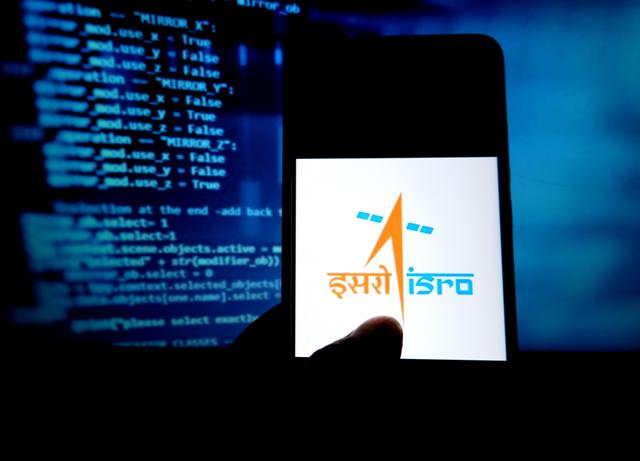 September 2019, India: The Indian Space Research Company (ISRO) logo seen displayed on a smartphone. [photo: Alamy - credit image: © Avishek Das/SOPA Images via ZUMA Wire]
September 2019, India: The Indian Space Research Company (ISRO) logo seen displayed on a smartphone. [photo: Alamy - credit image: © Avishek Das/SOPA Images via ZUMA Wire]
[This is an excerpt from an article in The Round Table: The Commonwealth Journal of International Affairs.]
India launched its space programme in the 1960s as a developing country with limited resources, intending to harness space to advance its social and economic development goals. However, the space programme has grown in the last decade, with two major changes: an ambitious space exploration programme and the growing use of space for national security. In future years, New Delhi’s space aspirations will most certainly be driven by growing security worries about China, notably Beijing’s growing counter-space capabilities. This is anticipated to result in a greater emphasis on national security components and the formation of new space security collaborations. India’s ambitions are mirrored in its Moon and Mars missions. The Indian Space Research Organisation (ISRO) is also hard at work on Gaganyaan, the country’s first human space mission, which is set to launch in 2023. Even though many people have questioned these developments because India is still a poor country, there are many reasons why the government feels it should not give up its space-related ambitions.
First, as India’s space programme matures and becomes more sophisticated, space exploration is the natural next step. With larger launchers and more complicated space operations, India’s space capabilities have risen slowly but steadily. Further space exploration to improve technical capabilities would be the logical next step. Second, while these missions may not directly aid development or society, they raise the prominence and reputation of the Indian space programme, making it a more appealing partner for others. Third, carrying out these missions has resulted in technological benefits. NASA assisted India’s first Moon mission and the Mangalyaan mission with deep space communication functions. These missions and developments are, it is felt, necessary for India if it wants to play a more prominent role in governing space worldwide.
Delhi launch of special issue on ‘India@75’
India at 75: Special issue launch in Bangalore
Introduction to special edition – Pakistan at 75
When India considers using space, military and security issues have become more critical. Even though New Delhi does not have a formal space strategy, official comments from the Indian Parliament and groups like the United Nations show that the country is becoming more militarily muscular. India’s space programme used to be driven by moral and sovereignty concerns. However, since the 1990s, it is driven by pragmatism and concerns about national security. For militaristic reasons, India’s space programme has built reliable launch capabilities and a variety of intelligence, surveillance, reconnaissance, and Earth observation satellites. These expanding capabilities should considerably improve the Indian military’s situational awareness, particularly in the border areas.
Some of India’s first military satellites, such as the RISAT series, were designed expressly for this purpose. Though these technologies were primarily designed in response to terrorist threats during the 2008 Mumbai attacks, they have a broader utility for all the country’s military services. India has also launched communication satellites to help each branch better coordinate its activities. Broader global space security trends and specific Indo-Pacific dynamics have encouraged India to invest heavily in military space capabilities. China’s anti-satellite (ASAT) test, conducted in January 2007, served as a wake-up call to India about the possible new risks it faces, sparking a new discussion about how it should secure its space assets. From this viewpoint, an unanimity developed among India’s political, military and scientific bureaucracies that a proper response was required to deter attacks on its space assets. Even though the administration of former Prime Minister Manmohan Singh approved research into ASAT capacity, the current Prime Minister Narendra Modi did not order an ASAT test until March 2019. This decision suggests that India’s long-held belief that better global governance of space will help protect its interests will either fail or will not be enough.
India has long criticised the superpowers’ use of space for military purposes. Furthermore, the ASAT test jeopardised the country’s interest in maintaining outer space as a peaceful domain, which is essential for India’s continued development. In the future, India should strengthen its ties with like-minded allies. It should compel the Quad partnership to step up its space security and governance efforts. The lack of agreement in multilateral space security negotiations and weapons control debates suggests that the Quad has the potential to play an essential role in bringing significant government perspectives together. The United Kingdom, Canada, France, and other countries should join the Quad in the future to be a collaborative platform for global negotiations.
Dr. Amit Verma is a Senior Assistant professor, Journalism & Mass Communication, Directorate of Online Education, Manipal University Jaipur, India.



